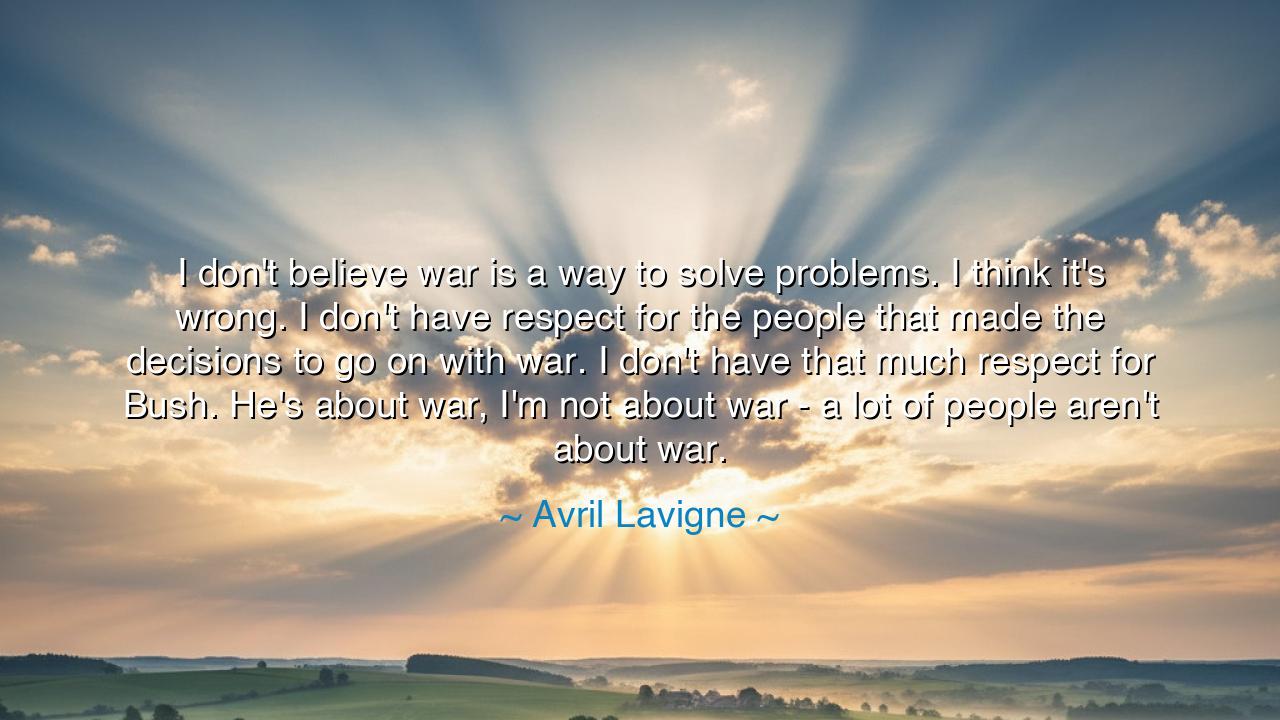
I don't believe war is a way to solve problems. I think it's
I don't believe war is a way to solve problems. I think it's wrong. I don't have respect for the people that made the decisions to go on with war. I don't have that much respect for Bush. He's about war, I'm not about war - a lot of people aren't about war.






Hear the earnest cry of Avril Lavigne, a voice not of generals nor kings, but of one who speaks from the heart of common humanity: “I don't believe war is a way to solve problems. I think it's wrong. I don't have respect for the people that made the decisions to go on with war. I don't have that much respect for Bush. He's about war, I'm not about war—a lot of people aren't about war.” These words, though born in the early years of the twenty-first century, carry the timeless spirit of those who have stood against the bloodshed of nations. They remind us that beyond flags and armies lies the eternal truth: war does not heal—it wounds. War does not solve—it shatters.
In her statement lies both defiance and lament. She does not dress her thoughts in political jargon, but speaks plainly: war is wrong, war is destructive, and respect is lost for those who choose it as the path of resolution. Her words echo the voices of countless mothers, poets, and prophets throughout the ages who have stood against the drums of conquest. In her simplicity, there is great power, for truth does not always need the robes of philosophy—it shines even in the speech of the young.
Consider the tale of World War I, once called “the war to end all wars.” Millions marched to the front, believing they fought for glory and homeland. Yet when the trenches filled with mud and blood, when gas burned the lungs of soldiers and machine guns cut down men by the thousands, what was gained? Empires crumbled, yes, but new seeds of hatred were sown, leading swiftly to another, greater war. The problems were not solved, only postponed, multiplied, and inherited by the next generation. Avril’s rejection of war reflects this eternal lesson: that violence breeds only more violence, and cycles of death cannot yield peace.
History gives us shining counterexamples of another way. Martin Luther King Jr., who fought not with weapons but with words, with marches, with songs of freedom. Facing the brutality of segregation, he did not take up arms, though many urged him to. Instead, he showed the world that nonviolence is not weakness, but the greatest strength. Through steadfast resistance without war, laws were changed, minds were opened, and dignity was restored to millions. King’s life proves that the power of peace is mightier than the sword. Avril’s words belong to this same lineage: the conviction that problems must be solved without unleashing rivers of blood.
The meaning of her declaration is thus twofold. First, it is a moral stand—that war is wrong in essence, because it tramples the innocent as swiftly as the guilty. Second, it is a personal stand—that she, and many like her, will not give respect to leaders who choose destruction when other paths remain. Respect is not owed to power for its own sake. It must be earned by wisdom, by justice, and by mercy. Leaders who seek war squander their honor, and the people who see clearly will withhold their reverence.
Let this lesson burn within you, child of tomorrow: question always those who cry for war. Do not be swept up by the banners, the slogans, the speeches of glory. Ask instead: who suffers? who profits? and what seed is sown in the soil of destruction? Respect not the makers of war, but those who build peace. Give your admiration not to the conqueror, but to the reconciler. For it is easy to call for bombs; it is far harder, yet far nobler, to call for dialogue.
To live by this teaching, cultivate peace in your own life. Resist anger with patience. Choose forgiveness when you are wronged. Raise your voice when leaders march toward violence, and join hands with those who seek harmony. Let your respect be reserved for the builders, the healers, the peacemakers. In your family, your community, your nation, let peace be your banner.
Thus, Avril Lavigne’s words, though spoken in youth and simplicity, carry the weight of ancient wisdom. War is not the cure for humanity’s ills; peace is. And those who know this truth must keep it alive, passing it forward, so that each new generation may rise to say: we are not about war—we are about life, and love, and the hope that endures beyond the battlefield.






AAdministratorAdministrator
Welcome, honored guests. Please leave a comment, we will respond soon